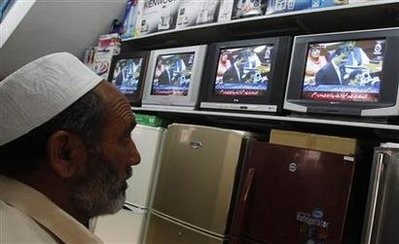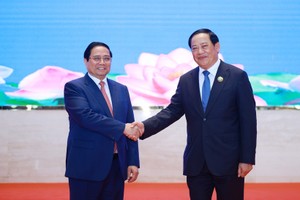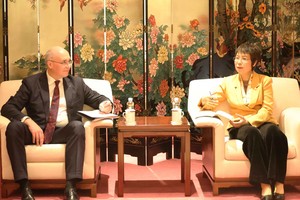Pakistan may let U.S. investigators question the wives of Osama bin Laden, a U.S. official said, a decision that could begin to stabilize relations between the prickly allies that have been severely strained by the killing of the al Qaeda leader.
However, a senior Pakistani government official in Islamabad said on Tuesday no decision had been taken on the U.S. request.
Bin Laden was shot dead on May 2 in a top-secret raid in the northern Pakistani town of Abbottabad to the embarrassment of Pakistan which has for years denied the world's most wanted man was on its soil.
The government is under pressure to explain how the al Qaeda leader was found in the garrison town, a short distance from the main military academy, and faces criticism at home over the perceived violation of sovereignty by the U.S. commando team.
Pakistani cooperation is crucial to combating Islamist militants and to bringing stability to Afghanistan and the U.S. administration has been keen to contain the fallout.
U.S. investigators, who have been sifting through a huge stash of material seized in bin Laden's high-walled compound, want to question his three wives as they seek to trace his movements and roll up his global militant network.
"The Pakistanis now appear willing to grant access. Hopefully they'll carry through on the signals they're sending," a U.S. official familiar with the matter said in Washington.
There was no immediate comment from the White House.
A Pakistani government official denied that permission for the U.S. questioning of the women had been given, saying local investigators had yet to finish their inquiry.
"It's too early to even think about it," said the official, referring to the U.S. request to question the women.

Pakistan says the three wives, one from Yemen and two from Saudi Arabia, and their children, will be repatriated and Pakistan was making contacts with their countries but they had yet to say they would take them, the official said.
Bin Laden's discovery has deepened suspicion that Pakistan's pervasive Inter-Services Intelligence (ISI) spy agency, which has a long history of contacts with militants, may have had ties with the al Qaeda leader, or that some of its agents did.
U.S. legislators have been asking tough questions, with some calling for a cut in billions of dollars of U.S. aid to the nuclear-armed Muslim country.
But the United States has stopped short of accusing Pakistan of providing shelter to bin Laden.
"We believe it is very important to maintain a cooperative relationship with Pakistan, precisely because it's in our national security interests to do so," White House spokesman Jay Carney said on Monday.
NATO Secretary-General Anders Fogh Rasmussen said Western governments had no alternative to cooperating with Pakistan in the fight against Islamic militants.
"If we are to assure long-term peace and stability in Afghanistan and beyond, then we need positive engagement with Pakistan," Rasmussen told the World Affairs Council in Atlanta on Monday.
"ABSURD"
Pakistani-U.S. relations were already at a low ebb after a string of diplomatic disputes over issues including a big attack by a U.S. drone aircraft in March and CIA contractor Raymond Davis, who shot dead two Pakistanis in January.
Potentially stirring tension further, a Pakistani TV channel and a newspaper have published what they said was the name of the undercover CIA station chief in Islamabad.
U.S. officials said the name disclosed in Pakistani media was wrong and the station chief would remain at his post.
They said they believe the leak was a calculated attempt to divert attention from U.S. demands for explanations of how bin Laden could have hidden for years in Pakistan.
Last year, after the chief of the Pakistani ISI was named in a U.S. civil case over attacks on the Indian city of Mumbai, the then-head of the CIA's Islamabad station was named by Pakistani media and forced to leave the country.
Pakistan Prime Minister Yusuf Raza Gilani, in his first major address since bin Laden's killing, rejected suggestions of incompetence or even complicity in hiding the al Qaeda leader.
"Allegations of complicity or incompetence are absurd," Gilani told parliament on Monday, saying it was disingenuous for anyone to accuse Pakistan of "being in cahoots" with al Qaeda.
U.S. President Barack Obama said on Sunday that bin Laden likely had "some sort" of a support network inside Pakistan, but added it would take investigations by Pakistan and the United States to find out the nature of that support.
Pakistan's main opposition party has called on Gilani and President Asif Ali Zardari to resign over the breach of sovereignty by U.S. special forces who slipped in from Afghanistan on helicopters to storm the bin Laden compound.
























